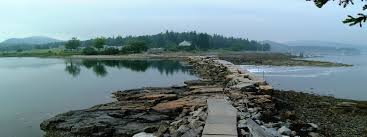causeway
英 [ˈkɔːz.weɪ]
美 [ˈkɑːz.weɪ]
- n. 堤道;铺道
- vt. 筑堤道于…
使用频率:

记忆方法
记忆“causeway”的方法是将其拆解为两部分:“cause”和“way”。想象一个“cause”(原因)引起的“way”(方式或路径),如同一条因某种原因修建的道路,比如因自然灾害导致的临时通道。这种方法将单词的组成部分和其含义结合起来,有助于记忆。
以上内容由AI生成, 仅供参考和借鉴
中文词源
causeway 堤道
来自词根calc, 石子,石灰,词源同calculate, chalk. 指用石子或石灰铺的路。
英语词源
- causeway
-
causeway: [15] Etymologically, a causeway is a road paved with limestone. In late Middle English, the word was causey way, causey coming via Anglo-Norman *cauce from Vulgar Latin *calciāta, an adjective derived from Latin calx ‘limestone’ (source also of English chalk, calcium, and calculate). The simple form causey ‘causeway, path’ survived dialectally well into the 20th century, and its French relative chausée, ‘road’ is still very much alive.
=> calcium, calculate, chalk - causeway (n.)
- 1570s, from Middle English cauceweye "raised road" (mid-15c.), first element from Anglo-French cauce, Old North French cauciee (12c., Modern French chaussée), from Vulgar Latin *via calciata "paved way," from Latin calcis, genitive of calx (2) "limestone," or Late Latin calciare "to stamp with the heels, tread" (on notion of a road or mound across marshy ground made firm by treading down), from Latin calx (1) "heel." For second element, see way (n.).
权威例句
- 1. The causeway to the island is only accessible at low tide.
- 通往该岛的堤道只有在枯潮时才能通行。
- 2. Bombay is linked to the mainland by a causeway.
- 孟买和本土间有一条堤道相连.
- 3. " They shot Sonny on the causeway, " Hagen said. " He's dead. "
- “ 人家在堤道上向桑儿开枪, ” 黑根说, “ 他给打死了.
- 4. The causeway was badly lit, there was not a single car.
- 堤道上的灯光照明很糟糕, 连一辆汽车也没有.
- 5. They went forward as briskly as they could on the uneven causeway.
- 他们用尽可能快的速度,在高低不平的堤上继续前进.